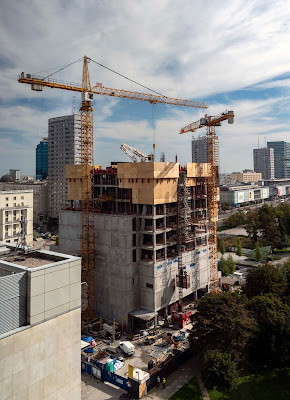It runs from Ciechanów to Ostrów Mazowiecka; the DK (droga krajowa = national road) 50 is the de facto western, southern and eastern ring-road of Warsaw. And linking Ostrów Mazowiecki to Ciechanów is the DK60, which closes the ring to the north.
Just north of Żyradów, the DK50 crosses the A2 motorway. Now, the A2 forms a part of the European Route E30, from Cork in Ireland to Omsk near the Russian border with Kazakhstan. The central part of this 6,530km-long route is motorway all the way from the port at Hook of Holland, through Berlin, Poland, Belarus, into Russia then Moscow, Chelyabinsk in the Urals... well, nearly all the way - you see there's a gap.
Heading east, you hit that gap on ulica Puławska, just 4km north of Jeziorki. For international traffic moving between Germany and Belarus and Russia, reaching the end of the S2 means an hour and a bit of crawling through Warsaw's congested urban roads, traffic lights every few hundred metres, and then over 120km of secondary road with just a 66km stretch of new motorway bypassing Minsk Mazowiecki.
The mandated alternative for heavy goods traffic in transit has long been the DK50, indeed it has been for decades before the A2 motorway ever reached Warsaw. The southern part of the ring, from Sochaczew (in the days when east-west traffic used the old Poznań-Warsaw road) to Minsk Mazowiecki dates back to 1977, and was created to keep heavy trucks out of the capital.
The Sochaczew-Minsk Maz transit route (named the 17 between 1977-85 and the 717 between 1985-2000) currently forms the southern section of the DK50. Much of the time, there is a high volume of international heavy goods vehicles with TIR plates, heading east to west and west to east. Over the years, the DK50 has been successively upgraded, in particular with bypasses built around towns and villages that were particularly scarred by traffic.
Such a village was Chynów, and its neighbour to the west, Drwalew. Work on this local bypass was completed at the end of 2007. The result is that the 'old' DK50 is now quiet, carrying little more than local traffic. Trucks roar past on the 'new' stretch, which at the closest is just 1.25km from my działka in Jakubowizna.
Can I hear them from there? The answer is - yes, when the wind is blowing from the west, north-west or north - but not at all when the wind is blowing from the east, the south-east or south. However, as I walk closer towards Chynów, yes, you can hear the DK50, loud and clear.
But this will change. Within a few months*, the S2 extension through Ursynów will open, crossing the Vistula on a new bridge, linking up across the river with the existing 66km-stretch of the A2 motorway that skirts Minsk Maz to the north. Though not a toll-road, the S2 will be an attractive alternative to the DK50 for much of the transit traffic, despite the ban on trucks over 16 tonnes in weight entering Warsaw between 07:00-10:00 and 16:00 and 20:00.
My guess is that the majority of off-peak transit will switch to the new A2-S2-A2 to get from Żyrardów to Minsk, rather than sticking with the old route. The new motorway/expressway route will be 87km, the current DK50 route is 114km. Not only will the new route save 27km, it will also be at least dual carriageway, whereas much of the DK50 is single carriageway.
But greater change is planned. This is grandly named Obwodnica Aglomeracji Warszawskiej (OAW - Warsaw Agglomeration Ring-road), bearing the number A50. Announced a year ago, the A50 will orbit Warsaw but at a tighter radius than the current DK50-DK60 ring. The OAW is to planned to be opened in 2027 (but as we know, this is highly unlikely). Crucially, the OAW is to be a part of the government's flagship CPK project (central communication port) in Baranów, a giant super-connector airport, high-speed rail hub and motorway network.
Looking at current plans for the OAW, there are four variants for bypassing Warsaw to the south, each of them will be closer to the city than the DK50. Assuming the OAW happens (I have my doubts, mainly as the prospects for mass airport-travel are bleak), the DK50 will be left as a ghost road, as quiet as Route 66 became when Interstate 10 bypassed most of it.
If that does happen, many of the service stations, bars and truck stops along the way will close. This happened when Chynów and Drwalew were bypassed.
Below: hurtling through at speed, drivers would hardly spot this old bar...
This time last year
A change in the weather
This time two years ago:
Zamek Topacz classic car museum
This time five years ago:
Curry comes to Jeziorki
[didn't stay long - but then not a good one]
This time six years ago:
Why we should all try to use less gas
This time seven years ago:
Polish supermarket chain advertises on London buses
This time 12 years ago:
Well-shot pheasants








































